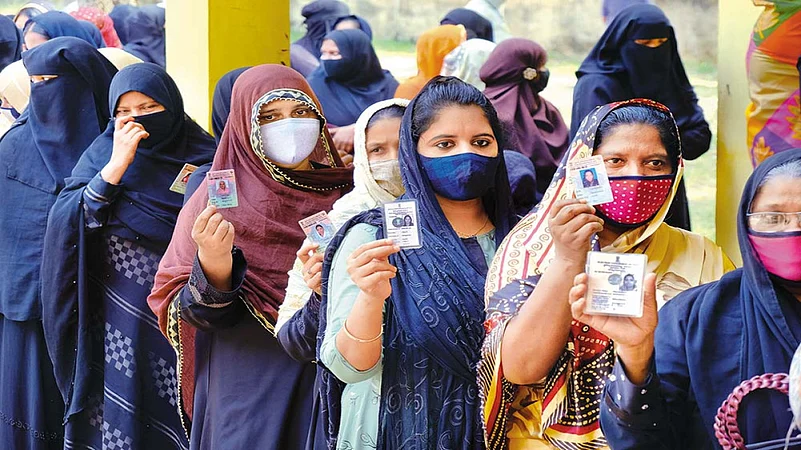More than 110 Muslim and over 500 Christian candidates for local body elections in Kerala should not come as a surprise given the state’s demographic composition. But there is a twist in the story—all of them are candidates of the BJP, seen more as a party that rides on Hindu votes for its electoral successes. And if any party knows how to win elections—in recent times, that is—the BJP has made a habit of it.
And for this reason alone, the panchayat, municipality and corporation elections in the Left-ruled state has put the spotlight on the BJP, coming as it were after the party’s spectacular success in the recent civic elections in Hyderabad. Elections to the 1,200-odd rural and urban agencies across 14 districts are being held in three phases from December 8 to December 14. Votes will be counted on December 16. The elections are likened to a warm-up game for the big final—assembly polls are due in four months in the last remaining Left-ruled state in India.
The stakes are high for the Left Democratic Front (LDF) led by the CPI(M) and the Congress-led United Democratic Front (UDF)—the two alliances that have traditionally ruled the state—while the BJP-led NDA is biting at the heels of both. The Pinarayi Vijayan government is feeling the heat more, with the Opposition’s relentless attacks over the high-profile gold smuggling case that allegedly involved former principal secretary M. Sivasankar. The National Investigating Agency (NIA) is probing the case.
Senior CPI(M) leader and former parliamentarian M.B. Rajesh dismisses the allegations as politically motivated and says the party is confident of repeating its thumping win in 2015 when it swept the local polls. “Most of the local bodies are run by the LDF and they have performed well in the past four-and-half years. People experienced the presence of a proactive government during crisis situations such as floods and the Covid pandemic. Public health, education, infrastructure development, social security and communal harmony have been well taken care of by the government. That’s the biggest strength of the government,” he says.
What sets these elections apart is the presence of hundreds of young woman candidates—mostly first-timers—in the fray. The CPI(M)’s Meenakshi Thampi, 21, the youngest candidate in Ernakulam, says educated youngsters will make a difference. “I was active in student politics for many years. Nobody can dismiss me as inexperienced as I am well aware of grassroots issues,” she says.
The optimism is shared by another young candidate, Gayathri Babu—making her debut in Vanchiyoor, one of the largest wards in the Thiruvananthapuram municipality. The 23-year-old, who holds a postgraduate degree in economics, says a candidate’s profile matters more than other issues in local polls.
However, political observers believe that the Opposition has managed to highlight allegations of corruption against the Left. Besides the gold smuggling controversy, the government is facing the heat over the alleged money laundering and narcotics case involving Bineesh, son of CPI(M) leader Kodiyeri Balakrishnan, who was forced to step down as party’s state secretary.
Political analyst J. Prabhash says the controversies will only have “diminished influence” in the elections. “Electoral patterns show that voters usually favour the Left in civic elections. Still, they won’t be able to repeat the 2015 win. The Left’s loss will be UDF and BJP’s gain. My sense is that UDF will have an edge over the BJP,” says Prabhash. In 2015, the UDF came second.
As allegations and counters fly thick and fast from all camps, the Congress’s alliance with the Welfare Party of India (WPI), an outfit of the Jamaat-e-Islami, has created division in its ranks. The BJP hopes to gain from that. “There is disquiet among the Christians against UDF and LDF. The Christians are unhappy with UDF’s pact with the Jamaat-e-Islami. There is a feeling that only Modi can bring development,” says BJP’s state chief K. Surendran.


























